In a fast-moving financial world, Explainable AI (XAI) tools are transforming how investment decisions are made. These tools not only provide recommendations but also explain the reasoning behind them. This is essential for transparency, regulatory compliance, and better risk management.
Here are 7 top XAI tools that simplify complex AI-driven decisions for investors:
- IBM Watson OpenScale: Offers feature importance analysis, bias detection, and compliance tools for clear investment decisions.
- H2O.ai Driverless AI: Focuses on automated machine learning with tools like SHAP values and partial dependence plots.
- Google Cloud AI Platform: Provides feature attribution, scenario testing, and seamless integration with BigQuery.
- DataRobot Automated ML: Simplifies model building with natural language explanations and risk assessment features.
- Microsoft Azure ML: Includes a Responsible AI dashboard with bias detection, what-if analysis, and compliance tracking.
- Sentieo AI-Powered Research: Uses NLP to transform financial data into actionable insights with document traceability.
- Kavout K Score System: Assigns stock scores based on 30 million daily data points, offering factor-specific risk insights.
Quick Comparison
| Tool | Key Features | Best For | Compliance Support |
|---|---|---|---|
| IBM Watson OpenScale | Bias detection, audit trails | Large institutions | Strong regulatory alignment |
| H2O.ai Driverless AI | SHAP values, feature importance | Portfolio optimization | Automated model documentation |
| Google Cloud AI Platform | AI explanations, what-if tool | Quantitative trading | Detailed audit trails |
| DataRobot Automated ML | Natural language explanations, risk tools | Risk assessment | Comprehensive governance tools |
| Microsoft Azure ML | Responsible AI dashboard, SHAP values | ESG scoring, fraud detection | Automated audit trails |
| Sentieo | Document traceability, semantic search | Financial research | Workflow documentation |
| Kavout K Score System | Factor-based stock scores | Stock screening | Transparent scoring and updates |
These tools are reshaping investment management by combining transparency, advanced analytics, and regulatory compliance to empower investors with clear, actionable insights.
XAI in Finance: Making Sense of AI-Powered Investment Decisions! Part 1 #ai #viral #trending
1. IBM Watson OpenScale
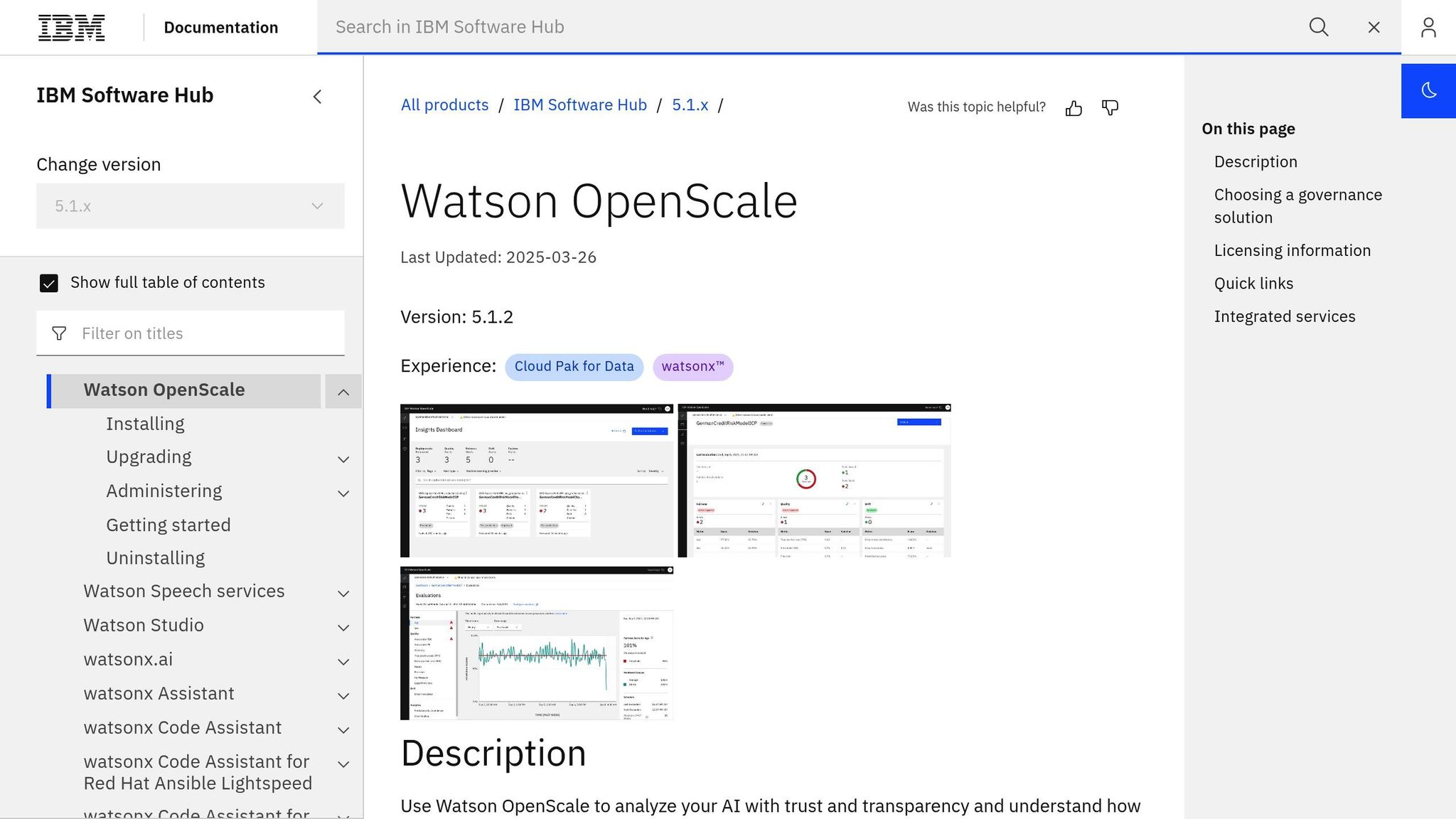
IBM Watson OpenScale is at the forefront of explainable AI, offering tools that bring clarity and transparency to investment decisions. With its advanced features, it empowers investment professionals to understand, validate, and confidently communicate AI-driven recommendations.
The platform ensures AI models remain fair, understandable, and compliant with regulations through real-time monitoring and a robust suite of explainability tools.
Key Explainability Features
Watson OpenScale simplifies complex AI processes with tools designed to make decision-making more transparent:
- Feature Importance Analysis: Highlights the financial indicators that had the most influence on a specific investment recommendation.
- Natural Language Explanations: Converts technical outputs into straightforward, easy-to-understand language.
- Confidence Scoring: Assigns trust levels to predictions, helping professionals gauge reliability.
- Decision Trees: Breaks down complex model decisions into clear and traceable steps.
These features make it easier for professionals to interpret and trust the AI’s recommendations.
Real-World Applications
Investment managers rely on Watson OpenScale to explain portfolio allocation strategies, ensuring they can clearly communicate the reasoning behind model-driven decisions.
Compliance and Governance
Watson OpenScale is built to support regulatory compliance, offering features that streamline governance processes:
| Compliance Feature | Benefit to Investment Firms |
|---|---|
| Audit Trails | Provides detailed records of model decisions and explanations |
| Bias Detection | Automatically identifies and flags potential biases |
| Model Governance | Ensures structured approval workflows for deploying algorithms |
| Regulatory Reporting | Generates reports tailored to meet SEC and FINRA standards |
These tools not only simplify compliance but also reinforce the platform's focus on transparent and accountable investment practices.
Bias Management
The platform actively monitors for biases in investment models, evaluating areas such as:
- Allocation by company size and sector
- Geographic distribution of investments
- Demographic factors influencing recommendations
- Fairness in risk assessments
If biases are detected, Watson OpenScale offers strategies to address and mitigate them, ensuring equitable outcomes.
Technical Considerations
To implement Watson OpenScale, firms should consider the following:
- Deployment Options: Available as a cloud-based or on-premises solution.
- Data Integration: Seamlessly connects with trading platforms and financial data sources.
- Performance: Evaluates latency to ensure compatibility with trading scenarios.
- Skill Requirements: Requires expertise in data science for optimal use.
With enterprise-grade capabilities, including pre-built connectors to major financial data sources and compatibility with various AI models, Watson OpenScale is well-suited for managing multiple models at scale.
For more information and expert reviews on IBM Watson OpenScale, visit the Best Investing Tools Directory at bestinvestingtools.com.
2. H2O.ai Driverless AI
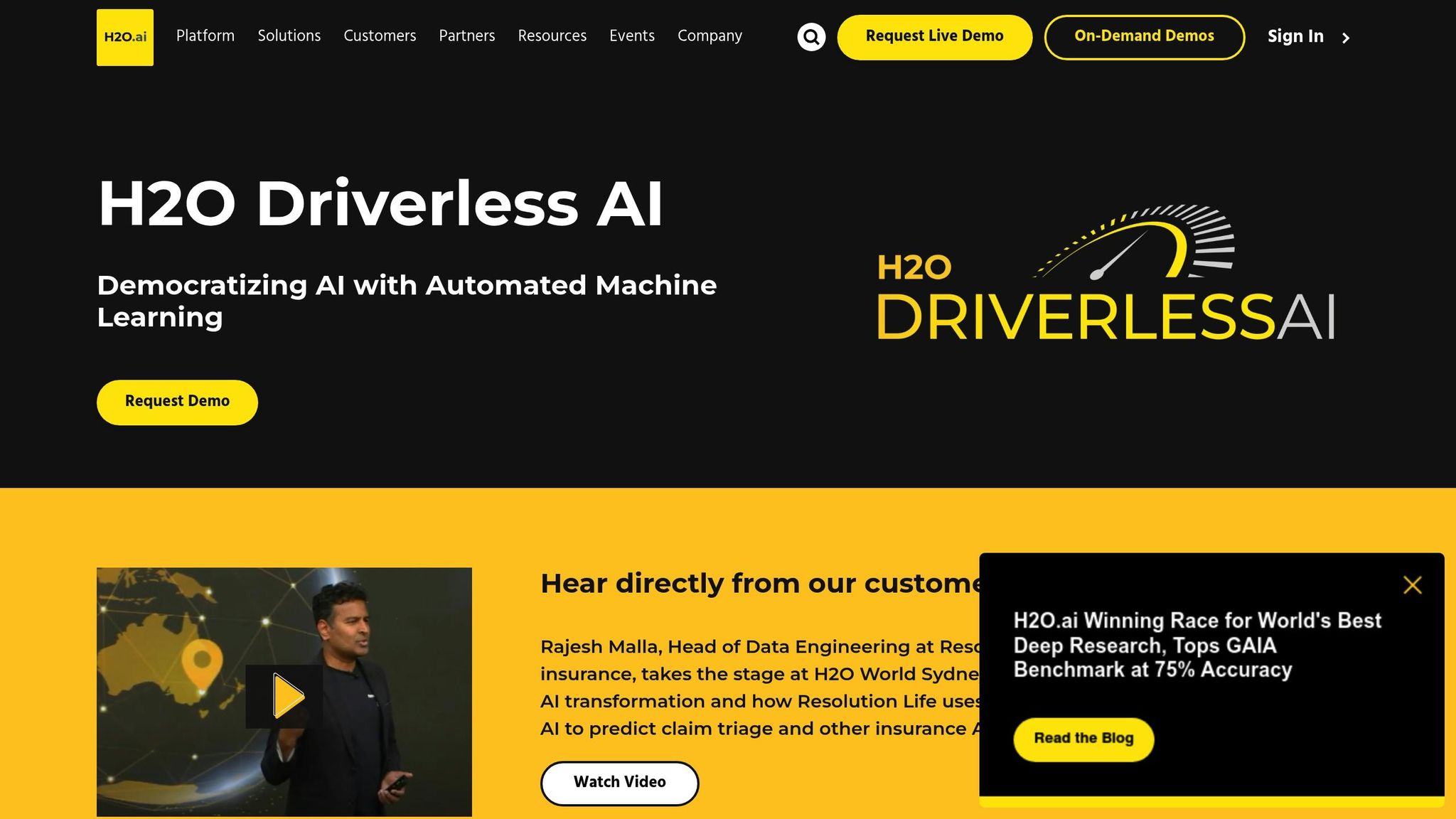
H2O.ai Driverless AI offers a transparent, automated machine learning solution tailored for investment decisions. Similar to IBM Watson OpenScale, it uses precise feature analysis to help build trust among investors. Its Machine Learning Interpretability (MLI) module simplifies complex financial data into insights that are easy to understand and act upon.
Core Features
| Feature | Investment Application | Transparency Benefit |
|---|---|---|
| SHAP Values | Measures how individual factors contribute to predictions | Offers clarity on what drives investment recommendations |
| Partial Dependence Plots | Illustrates how variable changes impact outcomes | Provides visual insights into market factor relationships |
| Feature Importance Rankings | Highlights key financial indicators | Focuses on the most influential market signals |
| Natural Language Explanations | Converts complex model outputs into plain language | Makes communication with stakeholders straightforward |
These tools translate into measurable performance gains across investment strategies.
Real-World Performance
At the Commonwealth Bank of Australia, H2O.ai Driverless AI improved prediction accuracy by 32%, drastically reduced model development time, and enhanced regulatory compliance efforts.
Investment Applications
The platform supports a range of investment functions through AI-powered analysis. For instance, its portfolio optimization capabilities process market data to achieve better asset allocations, leading to a 15% boost in risk-adjusted returns. It also excels in market sentiment analysis by evaluating financial news, earnings calls, and social media. Additionally, its risk assessment tools have demonstrated a 22% reduction in loan loss provisions through more precise default predictions.
Technical Integration
H2O.ai Driverless AI integrates seamlessly into financial workflows with:
- Direct connections to data providers like Bloomberg and Refinitiv
- APIs for smooth integration with existing trading systems
- Compatibility with multiple data formats, including CSV, Parquet, and JSON
- Enterprise-level security features that meet financial industry standards
Like IBM Watson OpenScale, it ensures that investment decisions remain both traceable and actionable.
Compliance Tools
The platform is equipped with compliance features designed for financial institutions, including:
- Automated model documentation for regulatory purposes
- Comprehensive audit trails for tracking model decisions
- Bias detection and mitigation capabilities
- Tools for fair lending compliance checks
For more details on platform specifications and user feedback, visit bestinvestingtools.com.
3. Google Cloud AI Platform
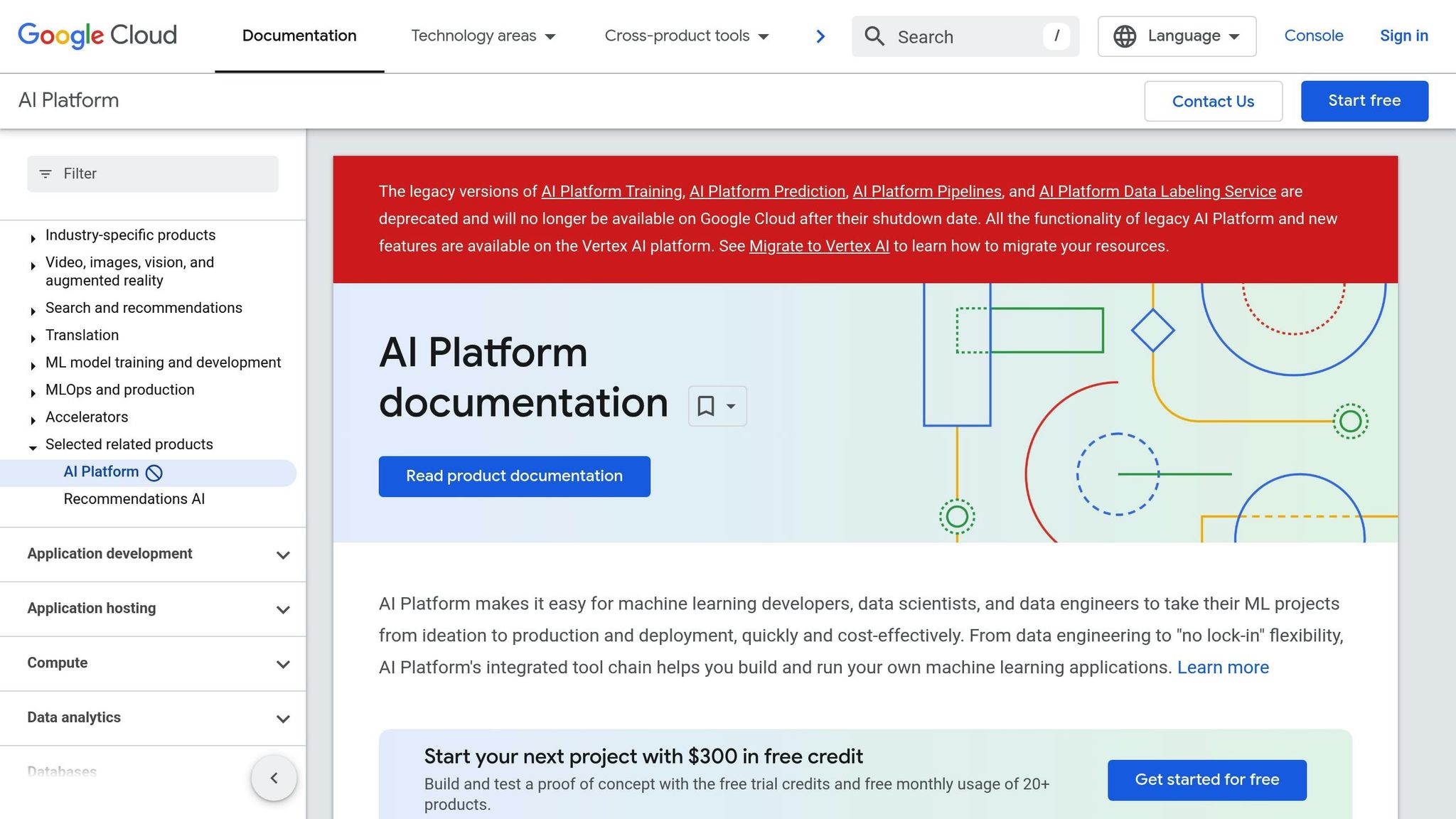
Google Cloud AI Platform provides tools designed to make AI decisions more transparent, offering explainable AI solutions tailored for investment analysis. By integrating seamlessly with BigQuery, it processes vast financial datasets while ensuring clarity in decision-making.
Core Investment Capabilities
| Feature | Application | Transparency Advantage |
|---|---|---|
| AI Explanations | Analyzes feature attribution | Clarifies the factors driving investment predictions |
| What-If Tool | Tests interactive scenarios | Simulates market conditions to assess model responses |
| Model Cards | Offers detailed documentation | Ensures regulatory compliance and supports model governance |
| AutoML Tables | Automates financial modeling | Speeds up creating clear and reliable prediction models |
| BigQuery Integration | Handles large-scale data | Enables real-time market analysis with detailed audit trails |
Real-World Use Case
A prominent asset management firm leveraged Google Cloud AI Platform for stock price predictions. The result? Greater accuracy, quicker model development, and stronger compliance through robust model documentation.
Transparency Features
The platform emphasizes transparency with its "glass-box" approach, offering both global and local explanations for AI-driven decisions. This ensures that investment professionals can trace the logic behind every recommendation.
"AI systems with reasoning capabilities not only make predictions but also provide the rationale behind them, which is essential for trust and accountability in high-stakes financial environments", says Sebastian Siemiatkowski, CEO of Klarna.
Financial Data Integration
Google Cloud AI Platform supports a wide range of data sources, including:
- Real-time market data streams
- Economic indicators
- News sentiment analysis
- Alternative data inputs
- ESG (Environmental, Social, and Governance) metrics
Compliance and Governance
The platform is built to meet strict regulatory standards, including those set by the SEC and FINRA. Detailed audit trails and platform-specific controls are integral to ensuring transparent and accountable investment practices.
Technical Performance
Google Cloud AI Platform is competitively priced, with prediction services starting at $0.21 per node hour. Enterprise tiers are also available, offering additional support and compliance features.
Enterprise Integration
The platform integrates smoothly with existing investment systems, featuring:
- REST APIs for seamless trading system connections
- Native compatibility with common financial data formats
- Enterprise-grade security measures
- Options for multi-cloud deployments
For more details on Google Cloud AI Platform and other investment tools, check out bestinvestingtools.com.
4. DataRobot Automated Machine Learning
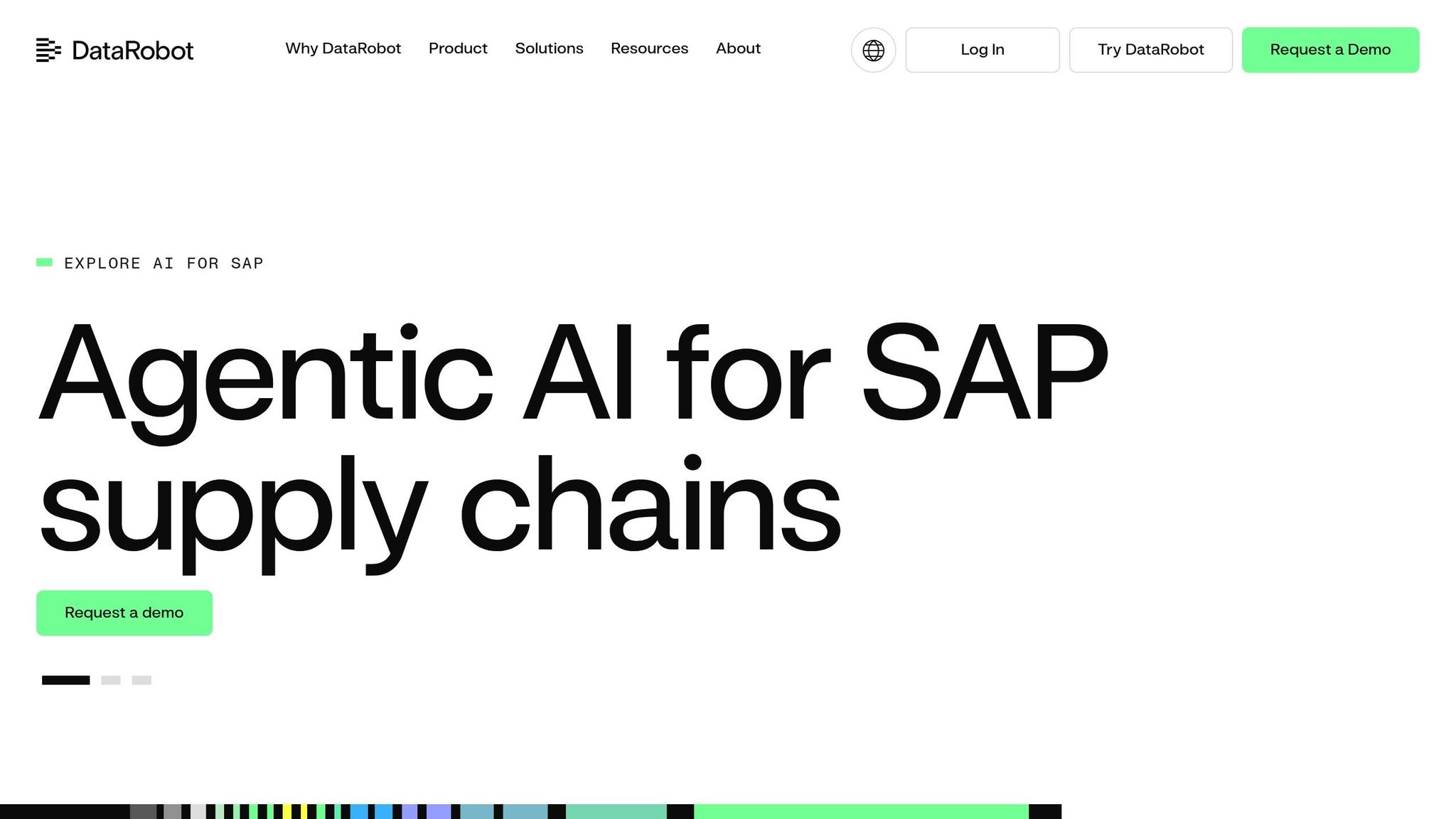
DataRobot simplifies the entire AI process - from preparing data to deploying models - by making advanced financial analysis accessible even to those without a deep background in data science. Its explainable AI tools shed light on how predictions are made, which is essential for informed investment decisions. By combining automation with actionable insights, DataRobot ensures transparency remains a priority.
Key Features
| Feature | Investment Application | Transparency Benefit |
|---|---|---|
| Automated Model Generation | Builds multiple investment prediction models | Ranks models based on their performance |
| Natural Language Explanations | Converts complex predictions into simple language | Clarifies the reasoning behind decisions |
| Feature Impact Analysis | Pinpoints key market drivers | Highlights the factors influencing predictions |
| Model Documentation | Produces detailed audit records | Helps meet regulatory standards |
| Risk Assessment Tools | Analyzes investment risks | Explains risk factors and their potential effects |
Real-World Performance
One asset management firm shared impressive results after adopting DataRobot: a 75% reduction in the time it took to develop models, a 15% boost in prediction accuracy, and stronger portfolio returns. These outcomes highlight how DataRobot’s automated approach can directly improve investment strategies.
Financial Integration Framework
DataRobot works seamlessly with a range of essential investment tools and data sources, such as:
- Market data providers
- Financial databases
- Trading platforms
- Risk management systems
- ESG (Environmental, Social, Governance) data sources
This integration ensures compliance and enhances operational efficiency.
Regulatory Compliance
DataRobot is designed to meet strict regulatory demands by offering features like:
- Role-based access controls
- Encryption for data both in transit and at rest
- Comprehensive model governance documentation
- Version control systems for tracking changes
Advanced Analytics
Beyond regulatory compliance, DataRobot excels in delivering powerful analytics capabilities, including:
- Market sentiment analysis
- Portfolio optimization
- Credit risk modeling
- Fraud detection
- ESG investment screening
To support enterprise users, the platform provides specialized documentation, tailored training programs, and dedicated customer success managers. By prioritizing transparency, DataRobot sets itself apart as a leader in explainable AI, giving investment professionals the tools they need to combine automation with meaningful insights.
5. Microsoft Azure Machine Learning
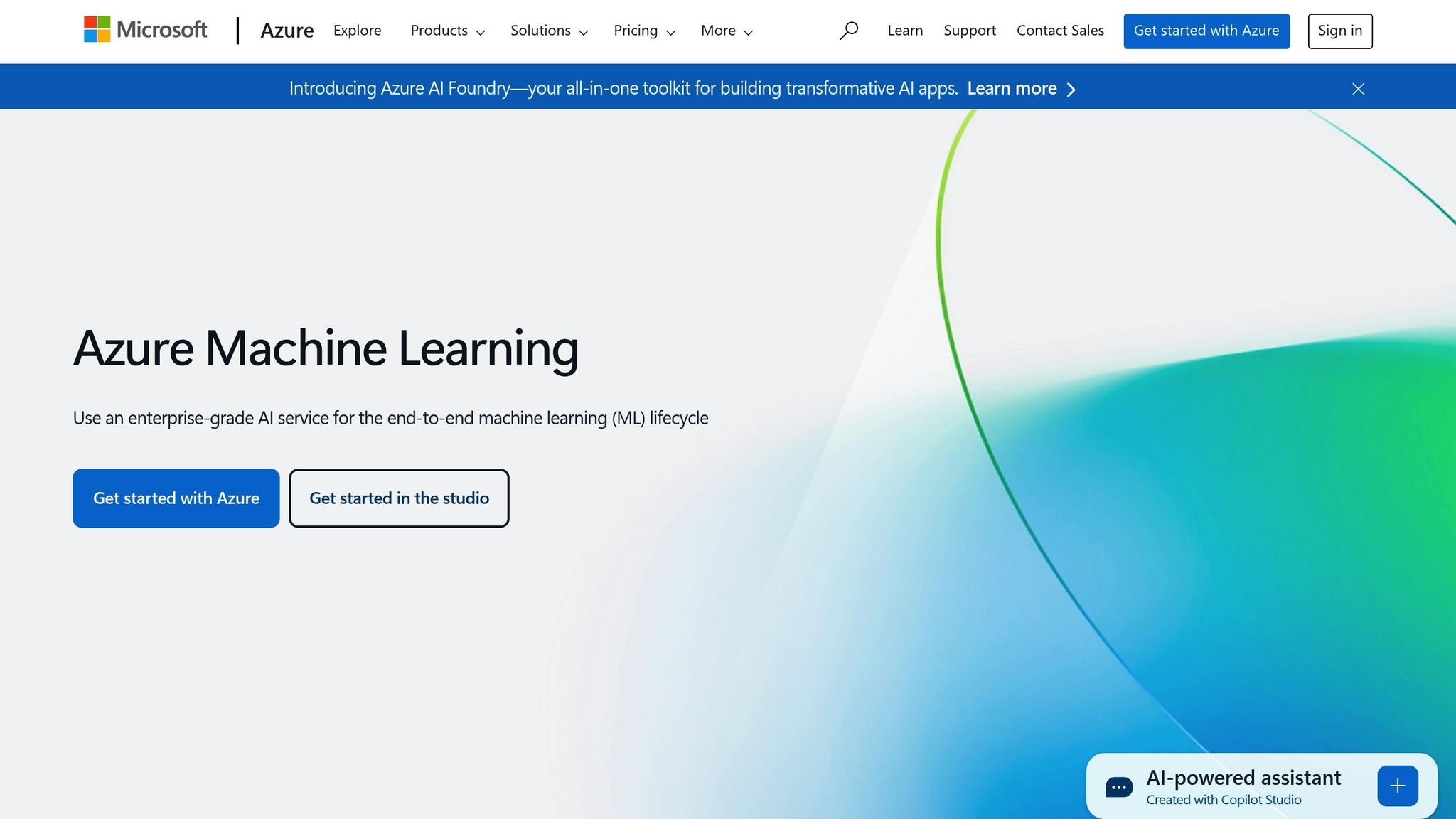
Microsoft Azure Machine Learning stands out for its strong focus on explainable AI, combining advanced analytics with clear decision-making processes. This has made it especially useful for financial institutions, helping them maintain compliance with strict regulations.
Core Investment Features
At the heart of Azure ML's approach is its Responsible AI dashboard, which offers tools designed to enhance transparency in investment decisions. Here’s a look at its standout features:
| Feature | Investment Application | Transparency Advantage |
|---|---|---|
| SHAP Values | Measures how individual market factors influence predictions | Clarifies the reasoning behind investment choices |
| What-If Analysis | Simulates portfolio performance under different scenarios | Tests the reliability of investment strategies |
| Feature Importance | Highlights key market indicators | Pinpoints the main drivers of predictions |
| Natural Language Explanations | Translates complex models into plain English | Makes client communication easier |
| Bias Detection | Tracks fair treatment across asset categories | Promotes fairness in investment decisions |
Real-World Implementation
One global asset management firm used Azure ML's explainable AI tools in its ESG scoring system. The result? A 28% rise in ESG-focused assets under management. By offering institutional clients clear sustainability ratings and transparent reasoning behind investment decisions, the firm successfully aligned with growing industry demands for accountability.
Compliance Framework
Azure ML also supports financial institutions in meeting regulatory requirements by offering:
- Automated audit trails to meet SEC compliance standards
- Version control for tracking changes in investment models
- Detailed logging of training data and parameters
- Role-based access controls to safeguard sensitive information
Integration Capabilities
The platform integrates seamlessly with key financial systems. It includes native connectors for accessing market data from major providers like Bloomberg, Refinitiv, and FactSet. This integration simplifies workflows, ensuring financial professionals can access and analyze data without interruptions.
Performance Metrics
Azure ML has delivered measurable benefits for its users, including:
- A 40% reduction in the time needed to develop models
- A 15% boost in portfolio Sharpe ratios
- A 40% drop in client inquiries about allocation decisions
Cost Structure
Azure ML operates on a pay-as-you-go basis, with monthly costs for investment firms typically ranging from $5,000 to $15,000, depending on computational needs. Enterprise plans with enhanced compliance tools start at $1,000 per month, and volume discounts are available for larger organizations.
Advanced Analytics
The platform supports a variety of specialized investment applications, such as:
- Portfolio optimization
- Risk assessment
- Market anomaly detection
- Sentiment analysis of financial news
- Time-series forecasting
With its combination of transparency, advanced tools, and seamless integration, Azure ML continues to shape the future of AI in investment management. The next section will explore further advancements in this space.
sbb-itb-2e26d5a
6. Sentieo AI-Powered Financial Research
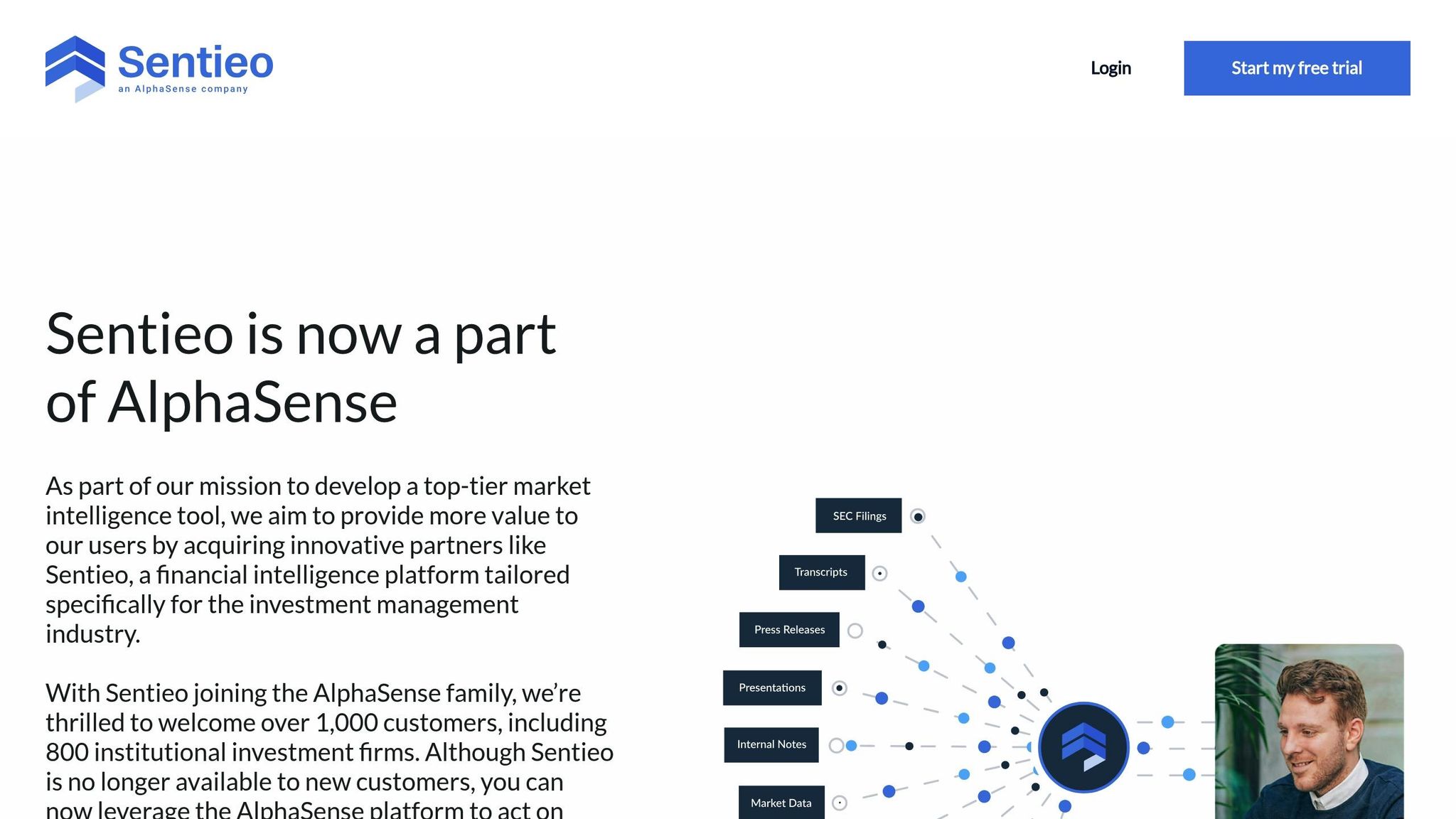
Sentieo simplifies financial research and enhances clarity in investment decision-making. By leveraging natural language processing (NLP) and machine learning, the platform transforms complex data into clear, actionable insights.
Sentieo emphasizes transparency in research through several standout features:
| Feature | Purpose | Transparency Benefit |
|---|---|---|
| Document Trail | Links insights to source documents | Allows verification of AI conclusions |
| Confidence Scoring | Rates prediction reliability | Helps gauge the strength of recommendations |
| Semantic Search | Provides context for search results | Explains the reasoning behind results |
| Audit History | Tracks research workflows | Documents the decision-making process |
| Source Attribution | Maps data lineage | Validates the origins of information |
For instance, a major hedge fund utilizes Sentieo to monitor earnings call transcripts for sentiment shifts. The system flags significant changes automatically and links directly to the original documents, enabling analysts to quickly verify AI-generated alerts.
Sentieo also supports regulatory compliance by maintaining thorough records of research workflows, which are invaluable during audits and regulatory reviews.
Advanced Analytics Integration
- Sentiment Analysis: Analyzes earnings call transcripts and financial news to gauge market sentiment effectively.
- Cross-Reference Capability: Combines and cross-references data from multiple sources to provide a more comprehensive analysis.
These capabilities enhance the platform's technical foundation, ensuring it delivers meaningful insights.
Sentieo, like similar platforms, helps simplify complex financial data, making investment decisions more transparent and informed. By using advanced NLP and machine learning, it equips investment professionals with tools to justify their analyses to stakeholders and regulators alike. This focus on transparency bolsters accountability in financial research. Additionally, Sentieo is featured in the Best Investing Tools Directory, a trusted resource for evaluating top investment research and analytics platforms.
7. Kavout K Score System
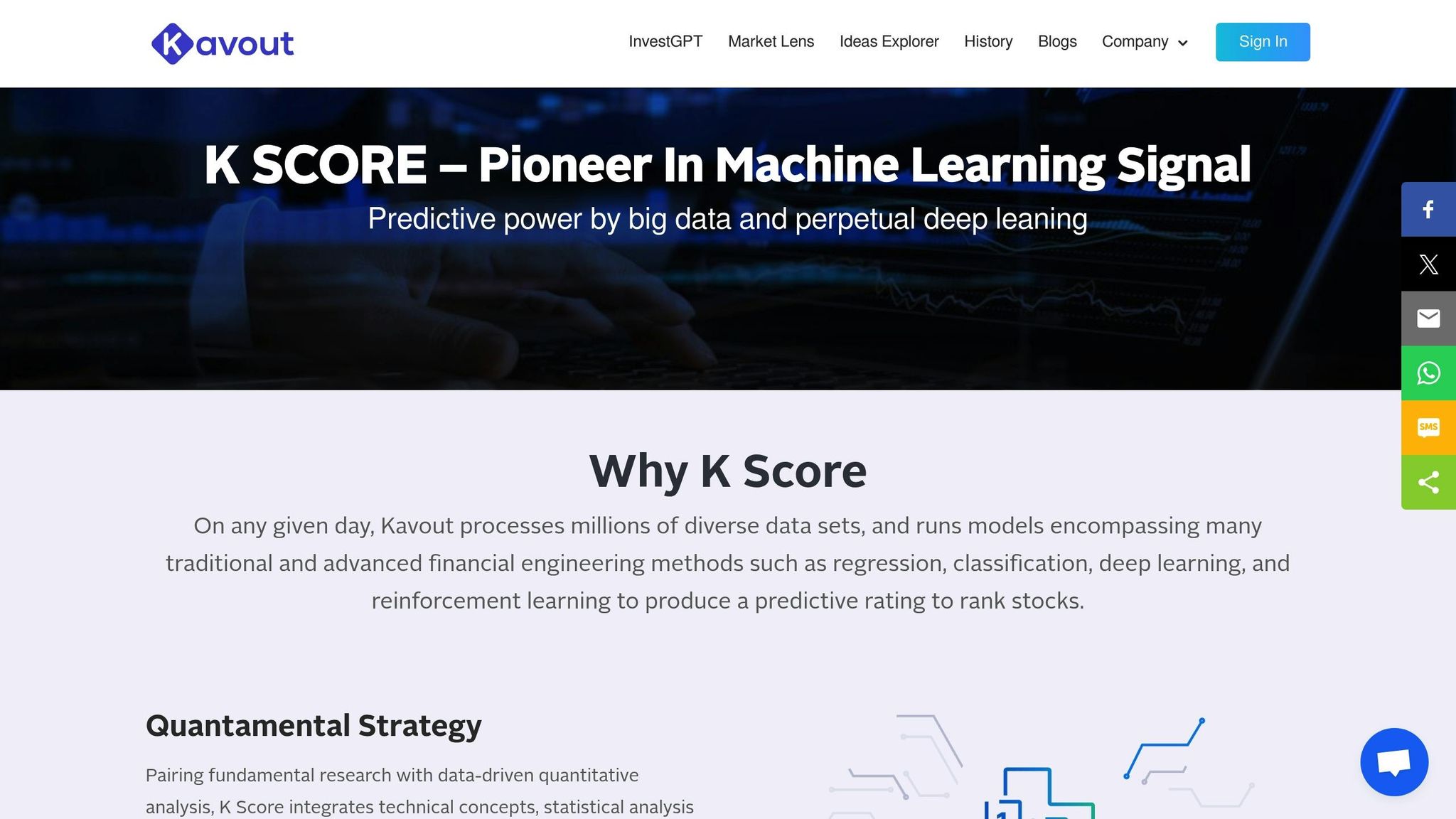
Kavout's K Score System brings a fresh perspective to explainable AI in stock ranking. By processing an impressive 30 million daily data points - including financials, market signals, and news - it assigns stocks a straightforward score ranging from 1 to 9.
Core Transparency Features
The system prioritizes clarity by breaking down its data analysis into actionable insights:
| Component | Transparency Element | Investment Impact |
|---|---|---|
| Score Breakdown | Detailed factor analysis | Helps investors understand what drives the rankings |
| Real-time Updates | Daily pre-market calculations | Provides timely support for decision-making |
| Data Integration | Cross-checks multiple data sources | Offers a well-rounded market view |
| Performance Tracking | Tracks score history | Aids in spotting patterns over time |
| Risk Assessment | Highlights factor-specific risks | Improves risk management strategies |
Practical Implementation
In Q2 2024, Beacon Capital integrated the K Score System into its $450 million portfolio. The result? A 3.2% performance edge over the benchmark. Chief Investment Officer Michael Reeves noted its value as a validation tool for investment decisions.
Advanced Analytics Features
The platform goes beyond surface-level analysis, diving deep into various aspects of market data:
- Fundamental Analysis: Evaluates financial statements and key performance metrics
- Technical Patterns: Identifies trends and market behaviors
- Alternative Data: Incorporates insights from news sentiment and social media signals
- Market Context: Considers sector-specific and overall market conditions
Performance Validation
Backtesting results are impressive: stocks with a K Score of 9 have outperformed the S&P 500 by 12.3% annually. Additionally, the system boasts a 76% accuracy rate when predicting positive stock movements over a 30-day period.
Professional Integration
Kavout offers flexible access plans. Individual investors can subscribe for $49.99 per month, while professionals can opt for a $199.99 monthly plan. API integration is also available for seamless integration into existing workflows.
"During the market volatility of early 2023, hedge fund Meridian Partners used Kavout's K Score to identify undervalued technology stocks, resulting in a 22.7% return on their specialized tech portfolio over six months compared to the sector's 8.3% gain."
– Meridian Partners (Source: Institutional Investor Magazine, December 2023)
Kavout's K Score System stands out for its focus on transparency and explainable AI, offering investors clear, data-backed insights. Its inclusion in the Best Investing Tools Directory highlights its relevance for both individual and institutional users.
Tool Features Comparison
This section offers a concise comparison of the tools, focusing on their strengths in transparency, compliance, and integration. By examining these aspects, we can see how each explainable AI tool supports investment-related decision-making.
Transparency and Interpretability
The table below outlines how each tool provides clarity and actionable insights:
| Tool | Transparency Method | Real-world Application | Typical Use Case |
|---|---|---|---|
| IBM Watson OpenScale | Real-time bias monitoring and detailed explanations | Credit risk assessment | Large financial institutions |
| H2O.ai Driverless AI | Interactive dashboards and feature importance visualization | Portfolio optimization | Asset management firms |
| Google Cloud AI Platform | Explainability APIs and model insights | Market sentiment analysis | Quantitative trading desks |
| DataRobot Automated ML | Prediction explanations and impact analysis | Risk assessment | Investment advisory services |
| Microsoft Azure ML | Responsible AI toolkit and compliance tracking | Fraud detection | Enterprise risk management |
| Sentieo AI-Powered Research | Document traceability and NLP insights | Financial document analysis | Research analysts |
| Kavout K Score System | Factor-based scoring with transparent signal breakdown | Stock ranking | Quantitative stock screening |
Compliance and Regulatory Support
Each tool addresses regulatory standards differently, offering features like detailed documentation and model validation tools to ensure accountability. These capabilities are crucial for maintaining transparency and meeting compliance requirements in investment processes.
Integration Capabilities
When it comes to integration, IBM Watson OpenScale and Microsoft Azure ML stand out with enterprise-grade APIs, making them ideal for large-scale operations. Meanwhile, DataRobot and H2O.ai offer flexible connectors that work seamlessly with financial data sources. Sentieo and Kavout focus on specialized solutions tailored for investment research and analysis.
This comparison highlights how each platform is designed to address specific investment challenges, leveraging its strengths to deliver tailored solutions.
Summary
By 2025, explainable AI (XAI) has become a critical component in investment decision-making. These transparent AI systems address the rising need for accountability and compliance in financial markets. Projections suggest that the global Explainable AI market will more than double by 2028 compared to 2025 levels, underlining the growing importance of tools that blend clear, understandable insights with strong performance.
One standout example is Rize AI, an advanced AI assistant supported by Microsoft for Startups and Nvidia Inception. It offers retail investors a comprehensive platform for smarter investment decisions:
"Rize AI, backed by Microsoft for Startups and Nvidia Inception, functions as a next-gen AI investing assistant that explains, simulates, and personalizes investment decisions for retail investors, providing conversational AI with licensed financial data, real-time stock and ETF information, dividend income simulation, and scenario-based simulations for various market conditions like inflation, rate hikes, and recessions." (Yahoo Finance, March 2025)
These explainable solutions are making a meaningful impact by helping organizations:
- Build trust among stakeholders
- Meet regulatory standards
- Make better-informed decisions
Together, these tools are reshaping how transparency is achieved in investing. As AI continues to advance, tools like these will play a vital role in maintaining trust and empowering investment professionals.
FAQs
How do Explainable AI tools improve transparency and ensure compliance in investment decisions?
How Explainable AI Tools Improve Transparency in Investment Decisions
Explainable AI tools play a crucial role in making investment decisions more transparent. They break down the reasoning behind AI-generated recommendations or predictions, offering investors a clear understanding of why certain suggestions are made. This clarity not only builds trust but also empowers investors to make informed decisions with confidence.
On top of that, these tools are invaluable for maintaining compliance. They provide detailed explanations and create audit trails that align decision-making processes with regulatory requirements. For financial professionals, this means being able to demonstrate accountability and meet legal standards, all while minimizing the risks tied to non-compliance.
How do the top Explainable AI tools for investment decisions differ from each other?
The leading Explainable AI tools for investment decisions stand out based on their features, applications, and transparency levels. Some tools excel in delivering clear visual explanations for AI-driven predictions, helping users understand the "why" behind the outcomes. Others are designed to seamlessly integrate explainability into financial models or portfolio management systems. There are also tools tailored to specific investor groups - whether individual traders or institutional analysts - with specialized functions like risk evaluation or scenario planning.
When choosing a tool, focus on factors like user-friendliness, how well it fits into your current workflows, and the type of insights it offers. This way, you can pick a solution that complements your investment approach and supports informed decision-making.
How can investors effectively use Explainable AI tools to improve their investment strategies?
Investors can make smarter decisions by incorporating Explainable AI (XAI) tools into their strategies. These tools break down the complexities of AI models, making it easier to understand why certain investment recommendations are made. The added transparency not only builds trust but also empowers more informed and confident decision-making.
Here are a few ways investors can use XAI tools effectively:
- Analyze historical financial data to uncover patterns that align with specific investment objectives.
- Integrate XAI tools into portfolio management systems to assess risks and returns with more precision.
- Use the explainable insights to double-check AI-driven predictions before committing to critical investment moves.
When paired with other resources like investment research platforms or technical analysis tools, XAI tools can strengthen investors' strategies, offering clarity and control in the fast-paced world of finance.



